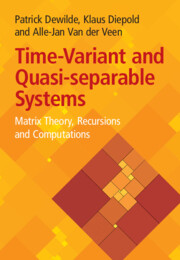Book contents
- Frontmatter
- Contents
- Preface
- Acknowledgements
- Part I Lectures on Basics with Examples
- Part II Further Contributions to Matrix Theory
- 12 LU (Spectral) Factorization
- 13 Matrix Schur Interpolation
- 14 The Scattering Picture
- 15 Constrained Interpolation
- 16 Constrained Model Reduction
- 17 Isometric Embedding for Causal Contractions
- Appendix: Data Model and Implementations
- References
- Index
13 - Matrix Schur Interpolation
from Part II - Further Contributions to Matrix Theory
Published online by Cambridge University Press: 24 October 2024
- Frontmatter
- Contents
- Preface
- Acknowledgements
- Part I Lectures on Basics with Examples
- Part II Further Contributions to Matrix Theory
- 12 LU (Spectral) Factorization
- 13 Matrix Schur Interpolation
- 14 The Scattering Picture
- 15 Constrained Interpolation
- 16 Constrained Model Reduction
- 17 Isometric Embedding for Causal Contractions
- Appendix: Data Model and Implementations
- References
- Index
Summary
This chapter introduces a different kind of problem, namely direct constrained matrix approximation via interpolation, the constraint being positive definiteness. It is the problem of completing a positive definite matrix for which only a well-ordered partial set of entries is given (and also giving necessary and sufficient conditions for the existence of the completion) or, alternatively, the problem of parametrizing positive definite matrices. This problem can be solved elegantly when the specified entries contain the main diagonal and further entries crowded along the main diagonal with a staircase boundary. This problem turns out to be equivalent to a constrained interpolation problem defined for a causal contractive matrix, with staircase entries again specified as before. The recursive solution calls for the development of a machinery known as scattering theory, which involves the introduction of nonpositive metrics and the use of J-unitary transformations where J is a sign matrix.
Keywords
Information
- Type
- Chapter
- Information
- Time-Variant and Quasi-separable SystemsMatrix Theory, Recursions and Computations, pp. 202 - 222Publisher: Cambridge University PressPrint publication year: 2024
